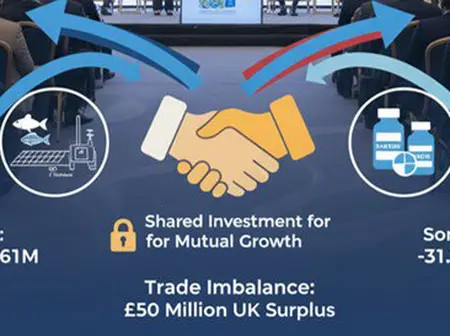The latest trade figures between the UK and Somalia reveal a rapidly evolving relationship marked by both promising growth and a clear need for greater balance. While the headline numbers indicate a significant strengthening of commercial ties, a deeper look reveals a dynamic that presents both immense opportunities and shared challenges for both nations.According to a UK Department for Business and Trade factsheet released on September 19, 2025, total trade in goods and services reached £72 million in the four quarters leading up to the end of Q1 2025. This impressive figure represents a 75.6% increase from the previous year, highlighting a genuine acceleration in economic activity. This growth, however, is primarily driven by a substantial rise in British exports to Somalia, which reached £61 million, a 144% increase. In contrast, imports from Somalia decreased by 31.3% to £11 million, resulting in a significant trade surplus for the UK of £50 million. This imbalance is a key feature of the current trade narrative.The surge in UK exports to Somalia is a positive indicator of a growing market in the Horn of Africa nation. British goods and services, including scientific instruments, medicinal and pharmaceutical products, and various manufactured goods, are meeting a crucial demand for products essential for development and reconstruction. This flow of advanced goods and healthcare supplies can act as a powerful catalyst for economic growth in Somalia, helping to build capacity and improve lives. It demonstrates Somalia’s growing capacity to absorb and utilize capital goods essential for its long-term stability.While UK exports are flourishing, the decline in UK imports from Somalia represents an unmet potential in the trade relationship. To achieve long-term economic self-sufficiency, Somalia must develop its own export industries to generate foreign currency and create sustainable employment. The current data suggests that Somalia’s nascent export sectors, such as livestock, fish, and frankincense, have not yet fully penetrated the British market. Addressing barriers to entry in the UK and fostering these industries would transform the relationship from a one-way flow of goods into a mutually beneficial partnership.The minimal foreign direct investment (FDI) from the UK in Somalia, at less than £500,000 as of the end of 2023, further highlights the shared challenge. A low level of investment reflects a lack of confidence from British private sector actors, which in turn limits Somalia’s ability to develop the productive capacity needed to create a robust export portfolio. Without investment, Somalia’s economy cannot grow and diversify, perpetuating a cycle of trade imbalance.For the trade relationship to be truly effective and sustainable, a collaborative effort is needed to rebalance it.• For Somalia, the focus must be on creating a more secure and predictable business environment. This includes strengthening legal frameworks, protecting property rights, and establishing a reliable banking system. Such reforms are crucial to attracting the foreign investment that is currently lacking.• For the UK, there is an opportunity to support the development of Somali export sectors actively. This could involve providing technical assistance to help producers meet international standards and investing in key industries, such as fishing and agriculture. By assisting Somalis in small and medium-sized enterprises (SMEs) to compete on the global stage, the UK can transition the relationship from a consumer-producer model to a genuine partnership.In conclusion, the growth in trade between the UK and Somalia is a positive sign, but it’s a step on a longer journey. The current imbalance presents a shared challenge that requires a joint commitment to creating a two-way boulevard of trade and investment. By focusing on mutual growth rather than one-sided dependency, both nations can build a relationship that not only increases in value but also contributes meaningfully to Somalia’s long-term stability and economic self-sufficiency.
Mohamed Mukhtar Ibrahim, former minister of petroleum and minerals in Somalia, can be reached by email at

Leave a Reply